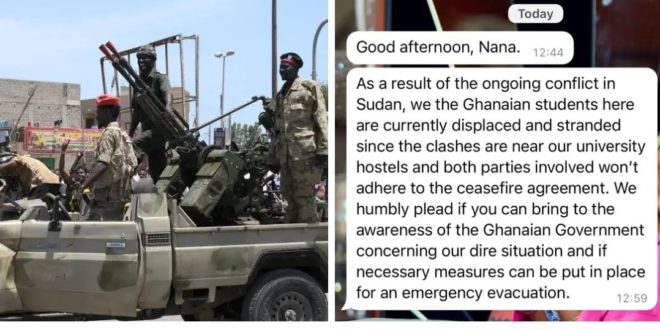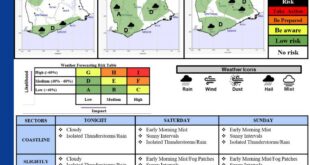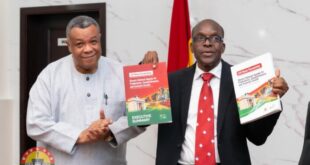Ghanaian students in Sudan have been left stranded and caged in their hostels due to the war currently going on in Sudan.
They are, therefore, calling on Government to put measures in place for an emergency evacuation.
This was revealed in a post on social media by media personality Nana Aba Anamoah.
“As a result of the ongoing conflict in Sudan, we the Ghanaian students here are currently displaced and stranded since the clashes are near our University Hostels and both parties involved adhere to the ceasefire agreement. We humbly plead if you can bring to the awareness of the Ghanaian Government concerning our dire situation and if necessary measures can be put in place for an emergency evacuation,”.
Good afternoon, Madam @AyorkorBotchwey
pic.twitter.com/bb9w9SqmxJ
— nana aba (@thenanaaba) April 21, 2023
According to theguardian.com, the power struggle between military factions erupted after the faltering transition to civilian-led government.
The Latter reported that Clashes between Sudan’s military and the country’s main paramilitary force have left at least 56 dead, while control of the presidential palace and the international airport in Khartoum is in doubt after disputed claims from both sides, in fighting that threatens to destabilise Sudan and the wider region.
What’s behind the fighting?
The clashes erupted amid an apparent power struggle between the two main factions of Sudan’s military regime.
The Sudanese armed forces are broadly loyal to Gen Abdel Fattah al-Burhan, the country’s de facto ruler, while the paramilitaries of the Rapid Support Forces (RSF), a collection of militia, follow the former warlord Gen Mohamed Hamdan Dagalo, known as Hemedti.
The power struggle has its roots in the years before a 2019 uprising that ousted the dictatorial ruler Omar al-Bashir, who built up formidable security forces that he deliberately set against one another.
When an effort to transition to a democratic civilian-led government faltered after Bashir’s fall, an eventual showdown appeared inevitable, with diplomats in Khartoum warning in early 2022 that they feared such an outbreak of violence. In recent weeks, tensions have risen further.
Gen Abdel Fattah al-Burhan.
Sudan’s armed forces are broadly loyal to Gen Abdel Fattah al-Burhan, the country’s de facto ruler.
How did the military rivalries develop?
The RSF was founded by Bashir to crush a rebellion in Darfur that began more than 20 years ago due to the political and economic marginalisation of the local people by Sudan’s central government. The RSF were also known by the name of Janjaweed, which became associated with widespread atrocities.
In 2013, Bashir transformed the Janjaweed into a semi-organised paramilitary force and gave their leaders military ranks before deploying them to crush a rebellion in South Darfur and then dispatching many to fight in the war in Yemen, and later Libya.
The RSF, led by Hemedti, and the regular military forces under Burhan cooperated to oust Bashir in 2019. The RSF then dispersed a peaceful sit-in that was held in front of the military headquarters in Khartoum, killing hundreds of people and raping dozens more.
A power-sharing deal with the civilians who led the protests against Bashir, which was supposed to bring about a transition towards a democratic government, was interrupted by a coup in October 2021.
The coup put the army back in charge but it faced weekly protests, renewed isolation and deepening economic woes. Hemedti swung behind the plan for a new transition, bringing tensions with Burhan to the surface.
Hemedti has huge wealth derived from the export of gold from illegal mines, and commands tens of thousands of battle-hardened veterans. He has long chafed at his position as official deputy on Sudan’s ruling council.
Gen Mohamed Hamdan Dagalo.
The paramilitary Rapid Support Forces are loyal to Gen Mohamed Hamdan Dagalo, known as Hemedti. Photograph: Ashraf Shazly/AFP/Getty Images
What are the faultlines?
A central cause of tension since the uprising is the civilian demand for oversight of the military and integration of the RSF into the regular armed forces.
Civilians have also called for the handover of lucrative military holdings in agriculture, trade and other industries, a crucial source of power for an army that has often outsourced military action to regional militias.
Another point of contention is the pursuit of justice over allegations of war crimes by the military and its allies in the conflict in Darfur from 2003. The international criminal court is seeking trials for Bashir and other Sudanese suspects.
Justice is also being sought over the killings of pro-democracy protesters in June 2019, in which military forces are implicated. Activists and civilian groups have been angered by delays to an official investigation. In addition, they want justice for at least 125 people killed by security forces in protests since the 2021 coup.
What’s at stake in the region?
Sudan is in a volatile region bordering the Red Sea, the Sahel region and the Horn of Africa. Its strategic location and agricultural wealth have attracted regional power plays, complicating the chances of a successful transition to civilian-led government.
Several of Sudan’s neighbours – including Ethiopia, Chad and South Sudan – have been affected by political upheavals and conflict, and Sudan’s relationship with Ethiopia, in particular, has been strained over issues including disputed farmland along their border.
Major geopolitical dimensions are also at play, with Russia, the US, Saudi Arabia, the United Arab Emirates and other powers battling for influence in Sudan.
The Saudis and the UAE have seen Sudan’s transition as an opportunity to push back against Islamist influence in the region. They, along with the US and Britain, form the “Quad”, which has sponsored mediation in Sudan along with the UN and the African Union. Western powers fear the potential for a Russian base on the Red Sea, which Sudanese military leaders have expressed openness to.
… as 2023 gathers pace, and you’re joining us from Ghana, we have a small favour to ask. A new year means new opportunities, and we’re hoping this year gives rise to some much-needed stability and progress. Whatever happens, the Guardian will be there, providing clarity and fearless, independent reporting from around the world, 24/7.
Times are tough, and we know not everyone is in a position to pay for news. But as we’re reader-funded, we rely on the ongoing generosity of those who can afford it. This vital support means millions can continue to read reliable reporting on the events shaping our world. Will you invest in the Guardian this year?
Unlike many others, we have no billionaire owner, meaning we can fearlessly chase the truth and report it with integrity. 2023 will be no different; we will work with trademark determination and passion to bring you journalism that’s always free from commercial or political interference. No one edits our editor or diverts our attention from what’s most important.
With your support, we’ll continue to keep Guardian journalism open and free for everyone to read. When access to information is made equal, greater numbers of people can understand global events and their impact on people and communities. Together, we can demand better from the powerful and fight for democracy.
Whether you give a little or a lot, your funding is vital in powering our reporting for years to come. If you can, please support us on a monthly basis from just $2. It takes less than a minute to set up, and you can rest assured that you’re making a big impact every single month in support of open, independent journalism. Thank you.
THANK YOU for constantly reading stories on MyGhanaMedia.com, news publishing website from Ghana. Kindly like, follow, comment and SHARE stories on all social media platforms for more entertaining updates!
Follow us on Twitter: https://twitter.com/
Source: MyGhanaMedia.com
There are four types of content published on MyGhanaMedia.com daily: curated content; syndicated content; user-generated content; and original content.

Admission is still in progress… Get yourself trained in any of our programmes to become a professional healthcare practitioner. Apply now! visit: racoh.edu.gh
 MYGHANAMEDIA.COM Best Source Of Latest News
MYGHANAMEDIA.COM Best Source Of Latest News





